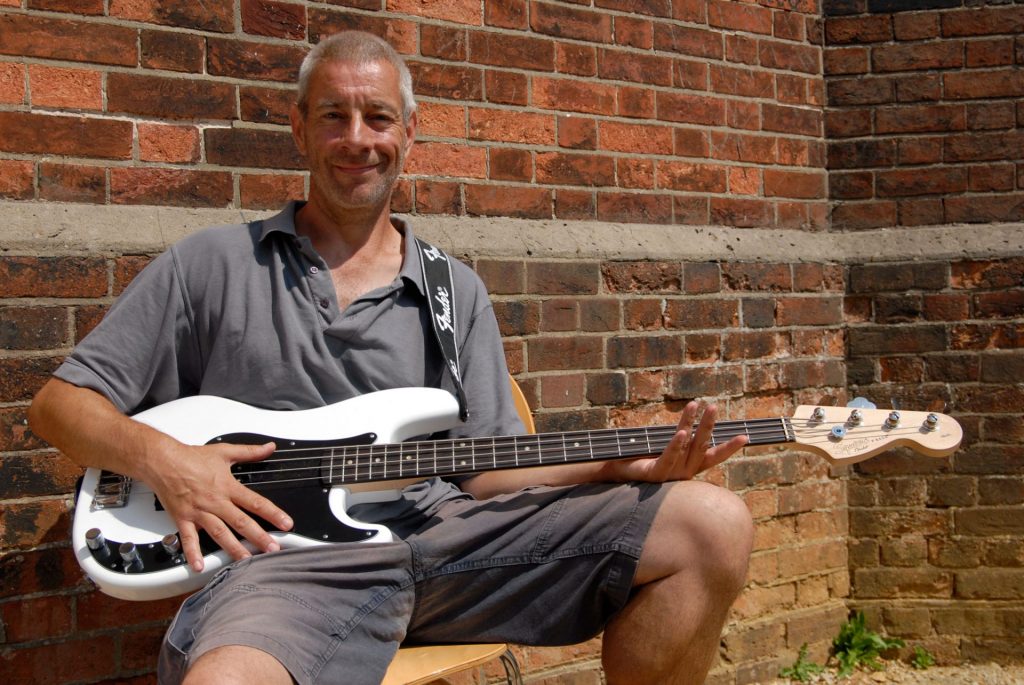I’ve lived most of my life in Brighton. I grew up in Whitehawk...
The area now known to estate agents as East Brighton. My mum died when I was very young and that took some adapting to.
My dad remarried and then a baby arrived on the scene. With the new baby and a much younger brother in the house, it was inevitable and maybe understandable that I’d get a lot less attention than the other two. My father could be mentally abusive and, at times, physically abusive. He wasn’t a drinker or a drug-taker. But he was a big smoker. If he didn’t have the funds to buy cigarettes, he was like a volcano going off.
Growing up, I always had the feeling I didn’t fit in. Compared to most families, mine was dysfunctional. At least that’s how I saw it at the time. I can see now that most families have deep-rooted issues. But it’s fair to say that I never felt included within my own family. So I would do silly things to get attention, like dropping bottles out of windows. It was the same at school. I was always looking for acceptance, so I became the class clown, the one who always ended up in detention.
I spent a lot of time on my own and I couldn’t cope with that isolation. I was never comfortable with my own company and that never really changed. I never thrived in social isolation. I needed to be part of a group. It didn’t have to be a good group of people. Just as long as it was a group I could get approval from.
Basically, I’ve always been a people-pleaser, dancing to everybody else’s tune, playing to the gallery. I spent my life pleasing everyone else but never really knowing how to please myself.
I was fourteen when I had my first drink. Pubs weren’t as strict about under-age drinking then. Me and my mate, Peter Ross, took a walk down to our local boozer and chanced our arm by ordering a couple of pints. Once we saw how easy it was, we popped in fairly frequently. I never had any particular ambition in terms of a career. I was too busy being something I wasn’t and it’s very exhausting being a full-time people-pleaser. At no point did I think in terms of something I’d really love to do with my life.
Around 1984, the only companies in Brighton that were really taking people on were the Post Office and British Rail. I went with the British Rail option because I didn’t fancy starting work in a sorting office every morning at 4am.
I ended up working for British Rail for 30 years – starting as a platform assistant at Brighton station, moving to the Red Star parcel office, then getting a job in maintenance. I then moved back to working on the platforms, moving up through the ranks to the position of supervisor. I liked the job, mainly because it was social; I was amongst people all day. I’d get the occasional troublemaker and the occasional swear word thrown at me, but I could have a good laugh with the passengers and there was good banter between the platform staff.
Through my twenties and thirties, and for most of my forties, drinking wasn’t really a problem for me and drugs were never my scene. I liked a pint after work, maybe two, but my drinking was never out of control. During that time, my drinking was steady and I could go days without. It was just a bit of a giggle. I was a happy drinker. Generally speaking, my life was fairly content. In any case, my job meant that I couldn’t drink heavily. It wasn’t about drinking on duty. The Transport Act of 1992 meant that I could be randomly breathalysed at any time, so I could be red-carded for having one too many the night before.
In 2015, I found a lump on my shoulder and was starting to lose sensation in my arm so I went to the doctor. I was expecting him to recommend that I stick to light duties for a few weeks. But he decided it was a severe problem and I was signed off long-term sick on full pay. Suddenly, I was in a position where my wages were still getting paid but I had all the free time in the world. That’s when my drinking started getting out of control.
Little had changed since I was a kid in the sense that I still had a problem with isolation. I couldn’t bear to sit at home alone, feeling like I was the only person on the planet, so I started drinking in pubs during the day. Looking back, my drinking built up very gradually over a twelve month period. At first, it was popping into my local for a couple of pints and a read of the newspaper around 1pm. Then I started doing two sessions a day: afternoon and evening. That turned into one long daily session, starting at 8.30am. I was never alone. I needed to be amongst people so I drank in a crowd. There was always a big table of us and we’d match each other drink for drink. Were they my friends or were they people I happened to drink with? I didn’t do anything else with them. I just drank with them. Every day. I didn’t want to go home where the only thing I had to look forward to was my own company. I can see now that my feelings about isolation stemmed from early childhood. Faced with the prospect of being on my own, I’d always opt for the company of people, even if they were the wrong people. I didn’t see the warning signs.
Over the course of a few weeks, my drinking escalated to the point where I was spending £50 a day in pubs. At Brighton prices, that’s around ten pints a day. If I’d been drinking at home, that £50 would have stretched to 24 cans or a couple of bottles of spirits. So it could have been a lot worse.
Even so, it was chaotic enough as it was. When my drinking started spiralling out of control, as I needed bigger and bigger hits, as my tolerance built up on a daily basis, I’d long since stopped enjoying a drink; I needed it to function. On top of the beer I started drinking whiskey in the pubs and my mood would alter. With a few whiskies inside me, I’d become touchy and argumentative.
By 2016 I’d returned to work but that didn’t last long. I was dismissed after arriving at work over the limit, having drank the night before. My life was quickly starting to unravel.
A new relationship took me away from Brighton to a little village in Lincolnshire but my drinking pattern just repeated itself. As soon as my partner went to work, I was on my own again and the drinking would begin. I was getting permanent hangovers by this point. If I went a couple of hours without a drink, the hangover would kick in, so I’d badly need another drink. I was permanently pickled, basically. Pissed as a pudding the whole time. The difference at this point was that I was living in an area of the country where booze was much cheaper. So I could get a lot more for my £50 when I walked into a pub. And there was always a crowd of people I could sit and drink with. All day. Every day.
I’d now reached the point where my first love was alcohol and I’d stopped thinking about the consequences of heavy drinking. In November 2016, I was arrested for hitting my partner’s boss. He’d been giving her a really hard time. I’d been drinking heavily and the red mist came over me. When I was released from Grimsby police station, I was told not to contact my partner. She’d reached her breaking point and had decided she didn’t want to live with an alcoholic. I ended up in emergency accommodation in Cleethorpes but, because I had no local connections, they had to get rid of me. So they sent me back to Brighton to live with my dad who’d agreed to put me up. They were sending me back to live with someone who’d been mentally and physically abusive to me. I knew that arrangement wasn’t going to end well.
After that, I was homeless for six months. I was on the street, sleeping in a shop doorway. One night, I was walking back to my spot and I was set upon by a pack of pissed-up young women. I was walking past them, minding my open business, when one of them punched me straight in the face. I fell to the floor and was stamped on. If that wasn’t enough to ruin my evening, I could taste blood in my mouth and realised they’d out knocked six of my front teeth.
Towards the end of 2016, I knew something had to give. I badly needed to stop drinking. I was on the street. I didn’t have a friend in the world. I’d driven everyone away, including those who had tried to help me.
I was now in service at Pavilions (Brighton) and my care co-ordinator could see from the outset that the big trigger for me was isolation and that my drinking. was exacerbated by a lack of structure in my life. So I’d started addressing the issue and I’d begun to get my head around the fact that the reasons for my drinking stemmed from my childhood. I was making some progress. But it wasn’t over just yet.
My rock bottom came when I found myself sitting on a bench on Xmas day that year. In the festive spirit, someone threw me some money. The only door open to me was a well-known pub in the centre of town. This would be my last blip, as it were. I walked through the door. Well, I wasn’t going to have an orange juice. I was feeling sorry for myself, watching life happen around me. Just like I felt when I was a kid, I wasn’t included. I didn’t fit in. I remember thinking, ‘You’re completely alone, mate, and you’re going to be alone for the rest of your life. Nobody wants you.’ I was surrounded by happy people enjoying their Xmas day, and I was desperate. I stayed in the pub until they kicked me out. I went straight to an off-licence and bought more whiskey and more beer. I’d given up all hope by this point.
The next thing I knew I was under observation in A&E, on a drip. They were desperately trying to flush the alcohol out of my body. I had to do some of my detox while I was still living on the street. On a cold night, well-meaning people would hand me a bottle of vodka or a couple of tins to help keep me warm and I’d be thinking, ‘I’m trying to stop. I’d rather have a coffee.’
Nobody warned me about the reality of recovery: the hallucinations, the sweats, the fact that it’s really hard work. The worst of it lasted five days. I was seeing staircases in the middle of rooms, spiders with red eyes…
I started volunteering at Pavilions in February 2017 as a service user rep after I’d been sober for a while. I started out doing some meeting and greeting. Slowly, I was getting my confidence back. I realised that I had a lot to give back. At Pavilions, even if someone walks through those doors a hundred times and says, ‘It’s happened again, I’ve had a drink’, then OK. I’ve been there. I know what they are going through as I’ve lived that experience. It can be emotionally draining because I can see that these people really, really want to change. ‘So let’s try again.’
I now do four hours a day Monday to Thursday at Pavilions. That work provides me with building blocks. I’ve got somewhere to go during the day where I feel safe and where I’ve got social contact. I know that my partner will be there when I get home. I’ve got a safe social circle now. I don’t keep in touch with the guys I used to drink with. To succeed in recovery, you sometimes have to cut away the dead wood. I know I can never drink again. One drink will open the floodgates.
Even if I have to spend time alone, it’s more manageable now. I can actually sit and read a book or stick my iPod on and listen to music. I was into music as a kid (The Jam, The Who) and loved going to gigs but I never had the confidence to pick up an instrument until my care co-ordinator at Pavilions introduced me to New Note Strummers. Before I found Strummers, I wouldn’t have believed that I was the kind of person who could play guitar. But she thought it would ideal for me, someone who didn’t thrive in isolation. She persuaded me to give it a go.
I could see that there would come a point when I would have to stand on my own two feet. You can’t go to recovery meetings for ever. How many times do you want to sit there and say, ‘I’m doing really well in my recovery’. You’re coping. You’ve managed to get yourself to a maintenance stage. You know your triggers. But you need to move on.
New Note was massively important to me in terms of moving on, in terms of improving my mental health and my state of well-being. The first rehearsal was on 17th January 2017. I was quite clumsy at first as I started finding my way around an acoustic guitar but the teacher, Will, was very patient with me. And I could see that I was surrounded by a good bunch of people who had been through what I’d been through, people who had lived the madness. These people weren’t going to judge me. Once I switched to bass guitar, I started picking it up relatively quickly. I was surrounded by some pretty accomplished musicians but I never felt daunted when we moved on from jamming together to performing actual songs. Whenever I felt I was out of time, I knew that, if I stopped and waited for a convenient point to drop back in, all would be OK.
A New Note Orchestra member was very encouraging and told me that I picked things up very quickly. He invited me to get involved, so I started playing bass for them too. At that point, I had the confidence to say ‘Why not?’ I was now in control of my insecurities. They’re still there, but I kick them into touch.
If my story can steer just one person away from the path I’ve been down, then it’s a great victory as far as I’m concerned. You can’t save everybody and you can’t change everybody. Ultimately, that person with an addiction has to want to change themselves. That’s where it begins. But sometimes you need to reach that point where you’ve lost everything. My period of heavy drinking was relatively short, just a couple of years, and it cost me everything. I regularly meet people who’ve been at it for thirty or forty years. Everyone’s story is different.



